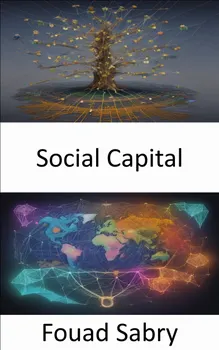What is Social Capital
Social capital can be described as "the networks of relationships among people who live and work in a particular society, enabling that society to function effectively" . Interpersonal relationships, a common sense of identity, a shared understanding, shared norms, shared values, trust, collaboration, and reciprocity are all essential components of this concept. It plays a role in the efficient operation of social organizations. A measure of the value of resources, both material and intangible, as well as the influence that ideal creators have on the resources engaged in each connection and on larger groups, social capital is a measurement of the influence that ideal creators have. Despite the fact that this does not correspond with the way that it has been assessed, there are many who have characterized it as a type of capital that generates public goods for a shared purpose.
How you will benefit
(I) Insights, and validations about the following topics:
Chapter 1: Social capital
Chapter 2: Social class
Chapter 3: Society
Chapter 4: Communitarianism
Chapter 5: Pierre Bourdieu
Chapter 6: Civil society
Chapter 7: Urban sociology
Chapter 8: Social mobility
Chapter 9: Robert D. Putnam
Chapter 10: Ethnic enclave
Chapter 11: Cultural capital
Chapter 12: Social position
Chapter 13: Civic engagement
Chapter 14: Cultural reproduction
Chapter 15: Sexual capital
Chapter 16: Culture change
Chapter 17: Social inequality
Chapter 18: Internet influences on communities
Chapter 19: Sex differences in social capital
Chapter 20: Social network
Chapter 21: Carol C. Gould
(II) Answering the public top questions about social capital.
(III) Real world examples for the usage of social capital in many fields.
Who this book is for
Professionals, undergraduate and graduate students, enthusiasts, hobbyists, and those who want to go beyond basic knowledge or information for any kind of Social Capital.














